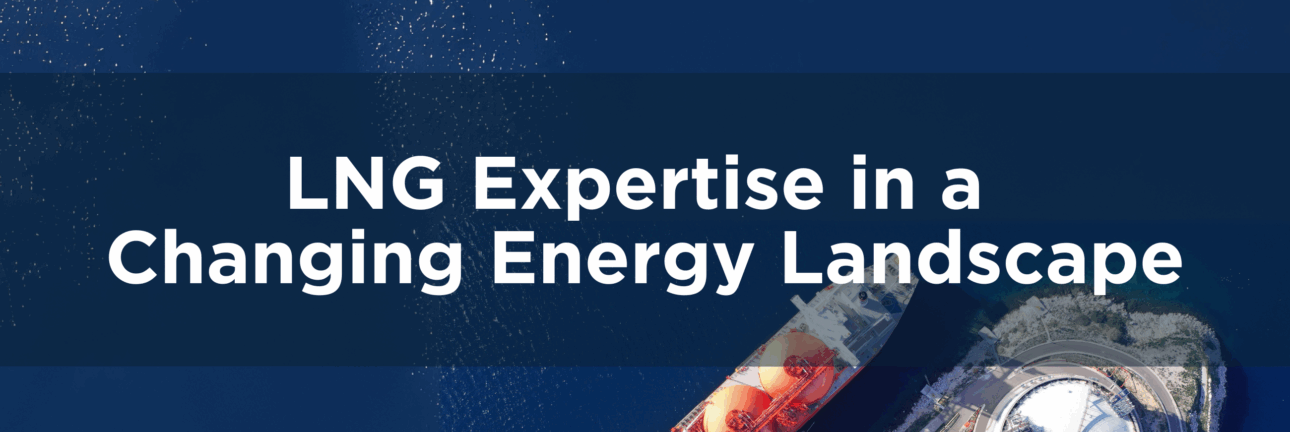LNG Expertise in a Changing Energy Landscape

Over the past three decades, AcuTech has built a reputation as a trusted partner in process safety and security across industries. As global demand for LNG (liquified natural gas) and maritime services continues to expand, the need for experienced leadership in safety and regulatory compliance has never been greater.
To explore these challenges, we spoke with several AcuTech consultants including Steve Calabrese for a focus on Maritime Services, Brad Fuller for insight on overall risk identification, and Colin Armstrong for perspectives on quantitative risk approaches along with insights from several other AcuTech consultants. We’ll start with Steve, as the lead for AcuTech’s maritime services, Steve has overseen a steadily growing number of LNG projects.
This fall, we’ll be publishing a series of blog posts based on our discussion. They will cover topics such as bunkering safety, hazard analysis and risk assessment in LNG operations, and navigating U.S. regulatory frameworks. We will also touch on LNG’s place in the emerging fuels market and the future of LNG operations. Stay tuned for the full series.
In first part of the conversation, Steve shares his professional journey. He also highlights the expertise he brings to the unique intersection of LNG infrastructure and maritime safety.
Background in LNG
Q: Can you give us a brief background on the work you’ve done in the LNG industry?
A: Over the past decade, I’ve worked extensively on LNG projects across the United States and internationally, with a primary focus on maritime safety, regulatory compliance, and process risk management. My work has included guiding clients through the U.S. Coast Guard’s (USCG) regulatory framework, supporting Federal Energy Regulatory Commission (FERC) filings for LNG export facilities, and ensuring compliance with standards such as National Fire Protection Association (NFPA) 59A and Pipeline and Hazardous Materials Safety Administration (PHMSA) pipeline safety regulations.
I’ve led the development of Waterway Suitability Assessments (WSAs), Operational Risk Assessments (ORAs), and emergency response plans that align with these U.S. requirements. This work often requires incorporating relevant international standards, including the International Maritime Organization’s (IMO) International Code of Safety for Ships Using Gases or Other Low-flashpoint Fuels (IGF Code) and guidance from organizations such as the Society of International Gas Tanker and Terminal Operator (SIGTTO) and the Society for Gas as a Marine Fuel (SGMF.)
A significant and important part of my work has also involved stakeholder engagement—whether coordinating with pilots’ associations, local emergency management agencies, or state regulators—to ensure that projects meet not only federal requirements but also regional and community expectations. I’ve supported projects from feasibility studies through operations, building a strong record of successfully helping clients obtain U.S. Coast Guard Letters of Recommendation (LORs), which remain a critical milestone in LNG project development.
Preparation for LNG & Maritime Safety Work
Q: How did your background prepare you for working at the intersection of maritime process safety and LNG infrastructure?
A: My background combines operational maritime experience with regulatory and process safety expertise, which has proven essential in the LNG sector. I began my career in maritime law enforcement and safety with the U.S. Coast Guard, serving as both a Port State Control Officer and a Maritime Law Enforcement Boarding Officer. That experience gave me first-hand exposure to vessel operations, regulatory compliance, and the critical importance of safety and security in high-risk environments.
Following my service, I spent 20 years in industry where I was directly responsible for ensuring U.S. Coast Guard regulatory compliance for marine operations as well as developing and managing U.S. Coast Guard facility safety and security program compliance. That work provided me with a practical understanding of how regulatory requirements are applied day-to-day, and how to integrate them effectively into operations without disrupting commercial viability.
Building on that foundation, I transitioned into consulting, where I’ve supported LNG projects through the U.S. regulatory framework—particularly 33 CFR Part 127, FERC processes, and PHMSA’s pipeline safety requirements. This role required not only a deep understanding of process safety and risk management, but also the ability to integrate those requirements with maritime considerations such as vessel traffic, pilotage, and emergency response coordination.
That blend of operational, regulatory, and consulting experience prepared me to work at the nexus of maritime process safety and LNG infrastructure. It has allowed me to translate regulatory requirements into practical solutions that improve both compliance and safety outcomes for clients.
Closing Thoughts
Steve’s background highlights why expertise matters in an industry where precision and preparation save lives, protect assets, and ensure smooth operations. His experience sets the stage for our deeper dive into LNG safety protocols, emergency readiness, and regulatory compliance. Stay tuned for these insights in our upcoming blog posts!
If you’ll be attending the 21st Americas LNG Summit & Exhibition in Lake Charles, stop by our booth. Meet Steve and learn more about AcuTech’s work firsthand.
